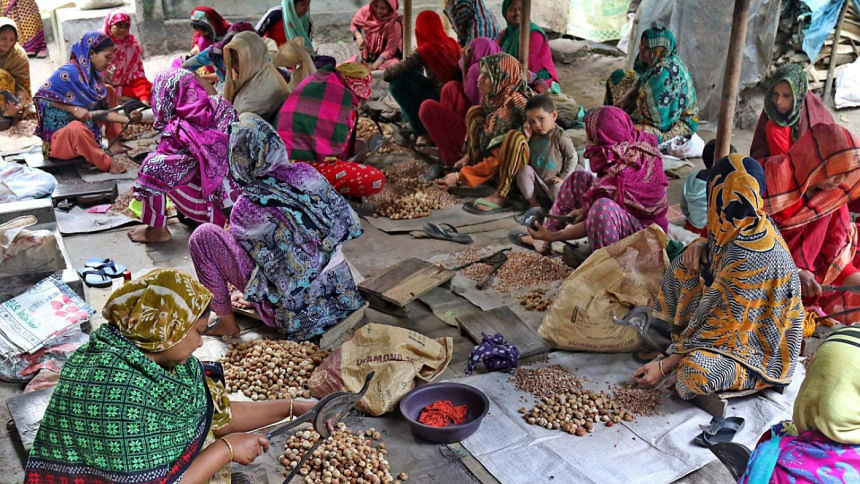Areca nut brings prosperity to Chittagong's Patiya upazila

Two decades ago, when Shamima Akhter and her husband Mohammad Yousuf started the business of cutting areca nut they had to leave their rented house because the constant noise of the nut-cutter annoyed the neighbours.
They had to do that several times, but stayed with the business in which they found potential.
Ultimately the couple not only changed their fortunes but also improved the lives of many others in the three unions of Chittagong's Patiya upazila.
“We lived through very difficult years,” says Akhter, “years of hardship and poverty.” In the 1990s Yousuf laboured in a betel leaf shop, which is how he came to understand that there was demand for the accompanying processed areca.
Later he opened a small shop of his own at Riazuddin Bazar, specialising in areca nuts which he bought wholesale, his wife would cut and they would sell. Demand grew and soon they decided to involve the neighbours. Thereafter the task of cutting areca nuts came to involve the entire neighbourhood.
“Our efforts finally paid off,” says Akhter. “I used to visit nearby villages to organise the women, show them how to cut areca to the required shape and size. Some were interested, others indifferent, but these days almost every poor woman in the area does this job.”
“The demand for processed areca nut is always there,” says Yousuf, “our constraint is capital. With greater capital another 5 – 10,000 village women could do this.”
Despite his words the once landless couple is now wealthy, with land, a car and a three-storey building. The business that started with Tk 20,000 now has 7 branches employing over 3,000 women, and a value of over Tk 1 crore, all achieved through cutting areca nuts.
The 3 unions of Patiya upazila, Char Lakka, Char Patharghata and Shikalbaha are not, by tradition, affluent areas. With low literacy rates, employment opportunities, especially for women, were limited. Before areca nut cutting became common, some women would beg or work as domestic help.
“We had no opportunity to earn money before,” says Hasina Begum, 45, of Banglapara village. “We used to sit idle and gossip. But now we can earn.” With her two daughters, she makes around Tk. 500 per day.
Kamal Hossain, 54, of Shikalbaha meanwhile, used to work as a labourer in Chaktai Khatunjang in the early 1990s. But twelve years ago, his right leg was impaired in an accident. “I begged for two years,” he says. “When everyone was talking about nut cutting I also started taking some areca nut to cut each day, as the work only involves using your hands. I earn about Tk 150 a day”, he said.
Every morning long queues are to be found outside the seven centres, women waiting to collect ten to twenty kilograms of areca nuts each. After cutting at home, the processed nuts are returned, with each woman paid Tk 10 per kilogram.
Processed areca nuts from Patiya are supplied daily to ten districts including Narayanganj, Mymensingh, Manikganj, Cox's Bazar and Rangpur. Up to 20 tonnes of processed nuts are produced daily.

 For all latest news, follow The Daily Star's Google News channel.
For all latest news, follow The Daily Star's Google News channel. 



Comments